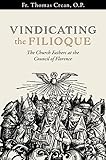Vindicating the Filioque : the Church Fathers at the Council of Florence / Fr. Thomas Crean, O.P.
Material type: TextPublisher: Steubenville, Ohio : Emmaus Academic, [2023]Copyright date: c2023Description: xvi, 475 pagine ; 23 cmContent type:
TextPublisher: Steubenville, Ohio : Emmaus Academic, [2023]Copyright date: c2023Description: xvi, 475 pagine ; 23 cmContent type: - testo (txt)
- senza mediazione (n)
- volume (nc)
- 9781645853176
- 9781645853183
- 262/.52 23/eng/20240125
- BT114 .C74 2023
- BQT 70.C74 2023
| Item type | Current library | Call number | Status | Barcode | |
|---|---|---|---|---|---|
 Opera (Magaz.)
Opera (Magaz.)
|
Biblioteca "Angelicum" Pont. Univ. S.Tommaso d'Aquino Temporary Library | BQT 70.C74 2023 (Browse shelf(Opens below)) | Available | 0030221788 |
Browsing Biblioteca "Angelicum" Pont. Univ. S.Tommaso d'Aquino shelves, Shelving location: Temporary Library Close shelf browser (Hides shelf browser)

|

|

|

|

|

|

|
||
| BQT 61.G8-2/4 Christ in Christian tradition / | BQT 61.N76 The Christological controversy / | BQT 61.T74 1980 The Trinitarian controversy / | BQT 70.C74 2023 Vindicating the Filioque : the Church Fathers at the Council of Florence / | BQT 70.S54 2010 The filioque : history of a doctrinal controversy / | BQT 81.A82V-S/12 Fides virtus : the virtue of faith from the twelfth to the early sixteenth century / | BQT 81.A82V-S/19 Soteriologie in der hochmittelalterlichen Theologie / |
Include bibliografia e indice.
"The Catholic doctrine of the Filioque-that the Holy Spirit eternally proceeds from the Father and the Son-has historically been a source of contention between the Western Church and the Eastern Church. While recent efforts to reach ecumenical agreement have claimed to overcome this divide, their proposed solutions not only overlook but overturn the consensus reached by West and East alike at the fifteenth-century Council of Florence, which defined the doctrine and clarified its rootedness in the teaching of the Fathers of the Church. In Vindicating the Filioque, Thomas Crean, O.P., mounts a robust ecumenical defense of the truth of this doctrine and the authority of its Florentine definition, building his case on principles common to both Catholics and Orthodox. The first part of the study gives a careful presentation of patristic testimony concerning the procession of the Spirit-material central to the conciliar debates at Florence and of abiding theological consequence. In the second part, Crean explores the nature of ecumenical councils, drawing on the first seven councils to establish criteria for conciliar ecumenicity and authority that can be used to evaluate the status of the Council of Florence. The third part describes the Council of Florence itself, showing how it fulfils the criteria for an ecumenical council and replying to objections against its authority. Combining thorough study of patristic texts, sensitivity to theological common ground, and historical attentiveness to the acta of the council, Vindicating the Filioque demonstrates the soundness of the Florentine definition of the Holy Spirit's procession and its importance as a basis for lasting unity of East and West".


